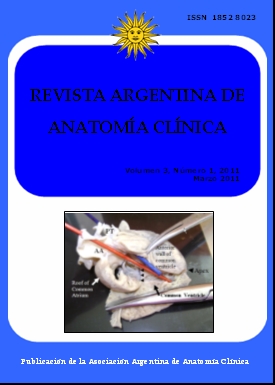PATTERNS OF ORBITOFACIAL AND ORBITAL GROWTH AT PRENATAL STAGE DERIVED FROM FETAL AUTOPSY STUDIES. Patrones de crecimiento órbito-facial y orbital en la etapa prenatal derivados de los estudios de autopsias fetales
DOI:
https://doi.org/10.31051/1852.8023.v3.n1.13913Keywords:
fetal autopsy, fetal biometry, fetal orbit, facial growth, morphometry, autopsies fetales, biometría fetal, órbita fetal, crecimient facial, morfometría,Abstract
Objetivo: Las mediciones orbitofaciales y orbitales del feto pueden ser útiles para el diagnóstico precoz prenatal de malformaciones craneofaciales. La mayoría de los estudios anteriores se basan en la ecografía y sólo hay unos cuantos estudios basados en autopsias fetales. El Análisis detallado de los distintos parámetros puede proporcionar una base de datos útil para una rápida referencia. Métodos: En cincuenta fetos normales de edades gestacionales diferentes, se midieron los siguientes parámetros: las distancias cantales externa e interna, la longitud de la hendidura palpebral, la longitud oropalpebral, la profundidad y la anchura de la órbita y la distancia interorbital. Resultados: El análisis estadístico reveló una correlación positiva significativa de todos estos parámetros con la edad gestacional y con el diámetro biparietal. Los patrones de crecimiento de los pará-metros orbitales y orbitofacial también demostraron una correlación significativa entre sí. Conclusión: Nuestros resultados muestran que el aumento de las partes laterales de la cara y de la longitud facial vertical se produce a un ritmo más rápido en comparación con la parte media de la cara. Las desviaciones de los datos normativos generados para los parámetros orbitales y orbitofacial ayudarán en la detección precoz de síndromes genéticos específicos.
Objective: Fetal orbitofacial and orbital measurements may be helpful in early prenatal diagnosis of craniofacial malformation. Most of the earlier studies are ultrasound based and there are only a few studies based on fetal autopsies. Comprehensive analysis of various parameters can provide useful database for easy reference. Methods: In fifty normal fetuses of different gestational ages, the following parameters were measured: outer and inner canthal distances, palpebral fissure length, oropalpebral length, depth and width of orbit and inter orbital distance. Results: Statistical analysis revealed significant positive correlation of all these parameters with gestational age and biparietal diameter. The growth patterns of the orbitofacial and orbital measurements also demonstrated significant correlation between these parameters. Conclusion: Our results demonstrate that the lateral parts of the face and the vertical facial length grow at a faster rate than the median part of the face. Deviations from the normative data generated for the orbitofacial and orbital parameters will help in early detection of specific genetic syndromes.
References
Adeyemo AA, Omotade OO, Olowu JA. 1998. Facial and ear dimensions in term Nigerian neonates. East Afr Med J 75:304-7.
Burdi AR, Lawton TJ, Grosslight J. 1988. Prenatal pattern emergence in early human facial development. Cleft Palate J 25:8-15.
Denis D, Burguiere O, Burillon C. 1998. A biometric study of the eye, orbit and face in 205 normal human fetuses. Invest Ophthalmol Vis Sci 39:2232-2238.
Diewert VM. 1985. Development of human craniofacial morphology during the late embryonic and early fetal periods. Am J Orthod 88:64-76.
Escobar LF, Bixler D, Padilla LM, Weaver DD. 1988. Fetal craniofacial morphometrics: in utero evaluation at 16 weeks’ gestation. Obstet Gynecol 72:674-679.
Escobar LF, Bixler D, Padilla LM, Weaver DD, Williams CJ. 1990. A morphometric analysis of the fetal craniofacies by ultrasound: fetal cephalometry. J Craniofac Genet Dev Biol 10:19-27.
Guihard-Costa AM, Menez F, Delezoide AL. 2003. Standards for dysmorphological diagnosis in human fetuses. Pediatr Dev Pathol 6:427-34.
Guihard-Costa AM, Khung S, Delbecque K, Ménez F, Delezoide AL. 2006. Biometry of face and brain in fetuses with trisomy 21. Pediatr Res. 59:33-8.
Johnston MC and Bronsky PT. 1995. Prenatal craniofacial development: New insights on normal and abnormal mechanisms. Crit Rev Oral Biol Med 6:368-422.
Kragskov J, Bosch C, Gyldensted C, Sindet-Pedersen S. 1997. Comparison of the reliability of craniofacial anatomic landmarks based on cephalomrtric radiographs and three-dimensional CT scans. Cleft Palate Craniofac J 34:111-6.
Roelfsema, Hop, van Adrichem, Wladimiroff. 2007. Craniofacial variability index in utero: a three-dimensional ultrasound study. Ultrasound Obstet Gynecol 29:258-64.
Siebert JR. 1986. Prenatal growth of the median face. Am J Med Genet 25:369-79.
Sivan E, Chan L, Uerpairojkit B, Chu GP, Reece Ea. 1997. Growth of the fetal forehead and normative dimensions developed by three-dimensional ultrasonographic technology. J Ultrasound Med 16:401-5.
Trenouth MJ. 1991. Relative growth of the human fetal skull in width, length and height. Arch Oral Biol 36:451-6.
Wu KH, Tsai FJ, Li TC, Tsai CH, Wang TR. 2000. Normal values of inner canthal distance, interpupillary distance and palpebral fissure length in normal Chinese children in Taiwan. Acta Paediatr Taiwan 41:22-7.
Downloads
Published
Issue
Section
License
Authors retain copyright and grant the journal right of first publication with the work simultaneously licensed under a Creative Commons Attribution License that allows others to share the work with an acknowledgement of the work's authorship and initial publication in this journal. Use restricted to non commercial purposes.
Once the manuscript has been accepted for publications, authors will sign a Copyright Transfer Agreement to let the “Asociación Argentina de Anatomía Clínica” (Argentine Association of Clinical Anatomy) to edit, publish and disseminate the contribution.



